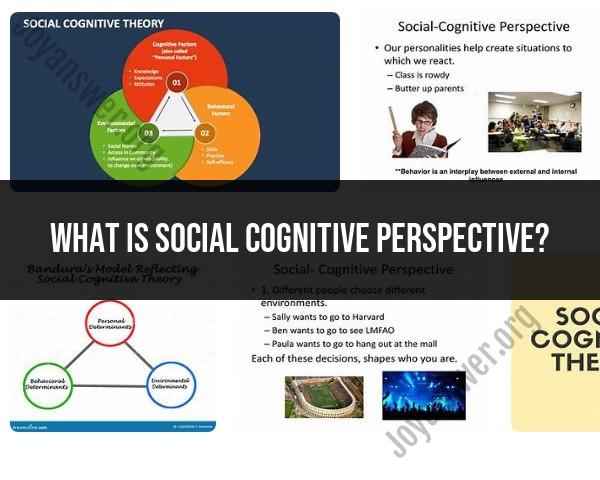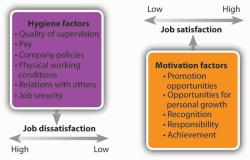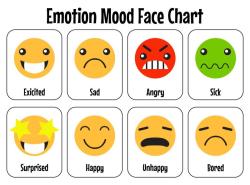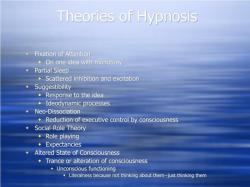What is social cognitive perspective?
The social cognitive perspective is a psychological framework that focuses on the ways in which individuals acquire, process, and apply information in social contexts. This perspective emphasizes the interplay between cognitive processes (such as perception, memory, and reasoning) and social factors in shaping human behavior and understanding social interactions. Here are some key components of the social cognitive perspective:
Observational Learning: Social cognitive theory, developed by Albert Bandura, places significant importance on observational learning. People learn from observing the behaviors, attitudes, and outcomes of others. This learning can lead to the acquisition of new skills and behaviors, including both positive and negative ones.
Modeling and Imitation: Individuals often model their behavior after the actions of others, particularly role models or people they admire. This process of imitation and modeling is central to the social cognitive perspective.
Self-Regulation: Social cognitive theory emphasizes the role of self-regulation and self-control in human behavior. People are not passive learners but have the ability to set goals, plan, and monitor their behavior. This self-regulation plays a crucial role in shaping their actions.
Expectancy and Reinforcement: The social cognitive perspective highlights the role of expectations and reinforcement in guiding behavior. People's beliefs about the likelihood of outcomes, along with the anticipated rewards or punishments, influence their actions.
Reciprocal Determinism: According to this perspective, human behavior is influenced by the constant interaction between personal (cognitive), behavioral, and environmental factors. These three factors are interrelated and mutually influence each other.
Social Influences: The social cognitive perspective recognizes the significant impact of social influences on behavior. These influences include family, peers, media, and cultural norms, which can shape an individual's beliefs, values, and behaviors.
Cognitive Processes: Cognitive processes, such as attention, memory, and problem-solving, are integral to understanding how individuals perceive, interpret, and respond to social information. These processes can affect an individual's ability to learn from their observations and experiences.
Self-Efficacy: A central concept in social cognitive theory, self-efficacy refers to an individual's belief in their own capabilities to achieve specific goals or tasks. High self-efficacy can lead to increased motivation and persistence in the face of challenges.
The social cognitive perspective is valuable for understanding a wide range of behaviors, from learning and education to social interactions, health-related behaviors, and even the influence of media on individuals. It acknowledges the complexity of human behavior and the dynamic interplay between cognitive, behavioral, and social factors in shaping our actions and choices.
An exploration of the social cognitive perspective in psychology
The social cognitive perspective (SCP) is a theoretical framework in psychology that emphasizes the role of social learning and observation in human behavior. It was developed by Albert Bandura in the 1960s and has since become one of the most influential theories in psychology.
Core principles and components of the social cognitive perspective
The SCP is based on the following core principles:
- People learn through observation. We learn by watching and imitating the behavior of others, especially those we admire and respect.
- Our cognitions (thoughts, beliefs, and expectations) influence our behavior. Our cognitions about ourselves, the world around us, and the consequences of our actions can all affect our behavior.
- Our behavior influences our environment. Our behavior can have a significant impact on the people and situations around us.
The SCP also includes a number of important components, such as:
- Self-efficacy: Self-efficacy is our belief in our ability to succeed at a particular task or challenge. Self-efficacy is a powerful predictor of human behavior.
- Reciprocal determinism: Reciprocal determinism refers to the bidirectional relationship between behavior, the environment, and personal factors. According to the SCP, these three factors interact in a complex way to influence our behavior.
How social cognitive perspective differs from other psychological frameworks
The SCP differs from other psychological frameworks in a number of ways. First, it places a strong emphasis on social learning and observation. Second, it acknowledges the role of cognition in behavior. Third, it takes a reciprocal deterministic approach, which means that it considers the bidirectional relationship between behavior, the environment, and personal factors.
Applications of social cognitive perspective in understanding behavior and development
The SCP has been used to understand a wide range of behaviors and developmental phenomena, including:
- Aggression: The SCP has been used to explain how children learn aggressive behavior through observation and imitation.
- Academic achievement: The SCP has been used to identify factors that contribute to academic achievement, such as self-efficacy and goal setting.
- Moral development: The SCP has been used to explain how children develop moral reasoning and behavior.
- Mental health: The SCP has been used to develop and evaluate treatments for a variety of mental health disorders, such as anxiety and depression.
Notable figures and studies associated with the social cognitive perspective
Some of the most notable figures associated with the SCP include Albert Bandura, Richard Walters, and Julian Rotter. Some of the most famous studies associated with the SCP include the Bobo doll experiment and the Stanford Prison Experiment.
Overall, the SCP is a comprehensive and influential theory that has been used to understand a wide range of human behaviors and developmental phenomena. It is a valuable tool for researchers, clinicians, and educators alike.












